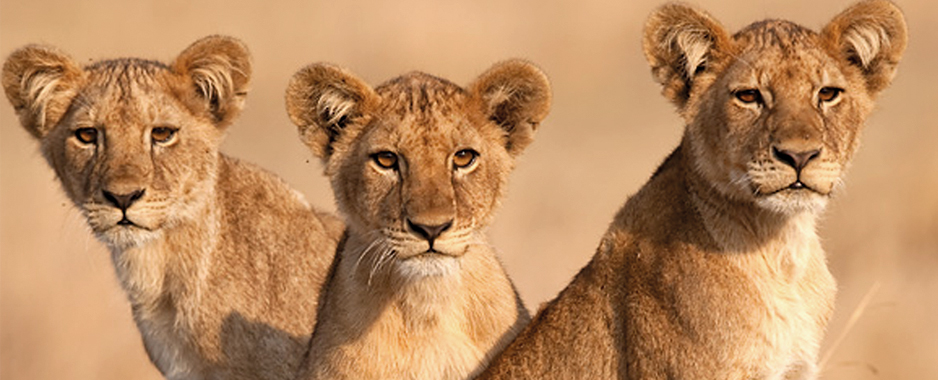Lions
As the sun disappears over the horizon, the lion’s deep, rumbling roar is heard all over his territory. He’s warning off intruders and calling to the members of his pride. Lions are the only members of the cat family (Felidae) to have manes. Even his female counterpart doesn’t have one but a lioness could still use her sharp claws and teeth to make a quick meal of you. Despite her ferocity and skill in hunting, she’s actually a social animal that likes to keep her family close.

While the lion is in charge of protecting their territory from rival males, the lionesses are out finding food for everyone and raising the cubs. (They like to hunt after dark, moving in groups of two or three lionesses, working as a team to stalk, corner and bring down their prey.)
Usually, 15 or more animals will make up a pride but sometimes a pride may have as many as 40 members! While there are only one or two lions at most, there are many lionesses in a pride – and they’re all related. Mothers, daughters, grandmothers, and sisters help each other raise the pride’s cubs. When they say hello, they like to rub against each other and purr gently. You can tell each animal apart by looking carefully at the spots on their muzzles.
Lionesses give birth to litters of cubs. They’re just a kg or two at birth, but they’ll grow into intimidating animals that can weigh as much as 259kgs! Since they’re so small and defenceless in the beginning, cubs are vulnerable to predators and the most dangerous are other lions! If a rival male succeeds in killing the cubs, the lioness might be willing to mate with him within a matter of weeks. He doesn’t want to wait for two years or more until the cubs are independent.
Though a mother will defend her cubs fiercely, she might also be the one to abandon them. In times of food scarcity, lionesses have trouble supporting their cubs and might choose to leave instead. A cub must be both lucky and healthy to grow into adulthood.
While they’re doing their growing up, cubs love to play. Ostrich eggs, turtles and even their mother’s tail make for fascinating toys. They also like to practice stalking and fighting, skills which will make them the most feared of predators when they grow up.
Lions were once found in Africa, southern Europe, and parts of Asia. Africa remains one of the last places they’re found in the wild, but a few still roam free in the Gir Forest of India.

comments powered by Disqus

























